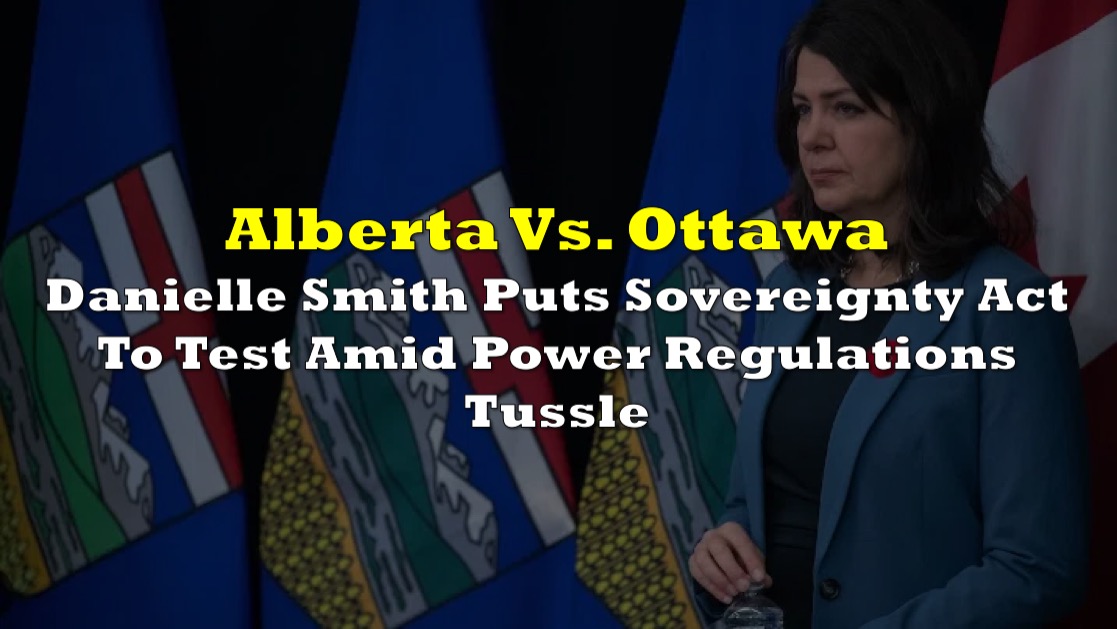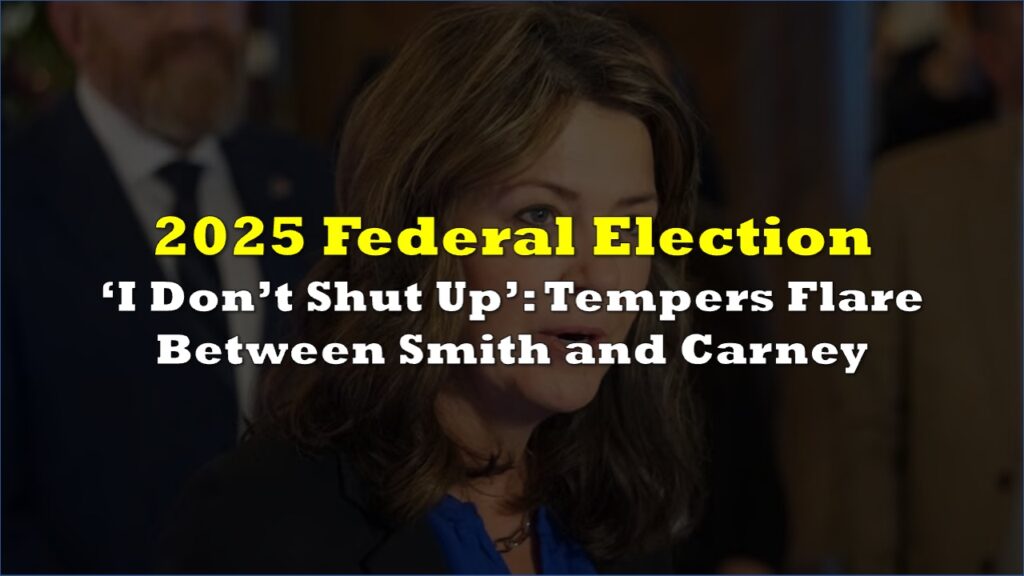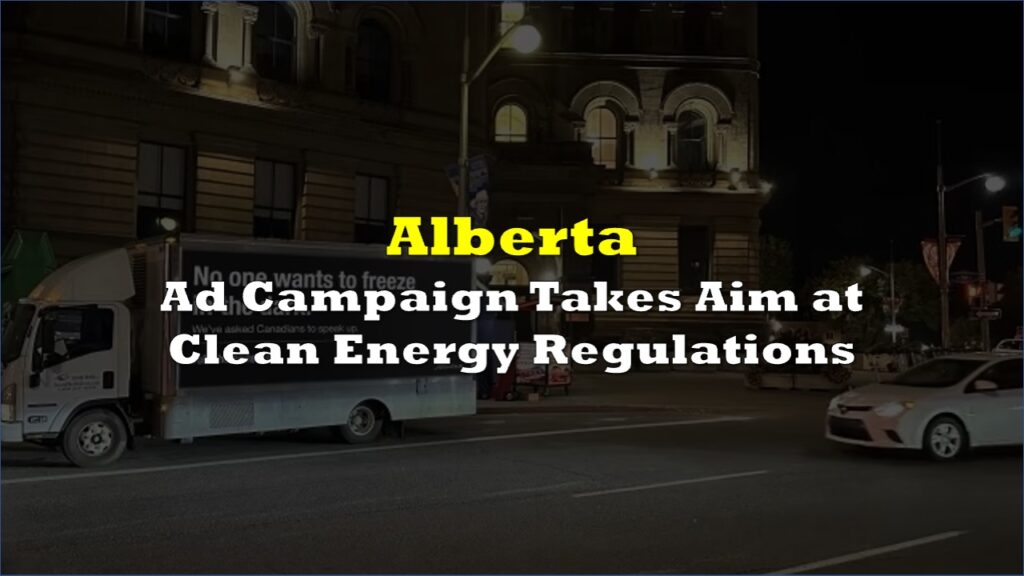Alberta’s Sovereignty Act is undergoing a significant test as Premier Danielle Smith introduces the first resolution under the banner of “Alberta Sovereignty Within a United Canada.” This move comes in response to the proposed federal net-zero electricity grid regulations.
In a media event on Monday, Smith outlined that if passed, the resolution would prompt the cabinet to direct all provincial entities to refrain from enforcing or complying with the federal Clean Electricity Regulations.
Smith expressed her concerns about the proposed federal rules, emphasizing that they would establish emission standards for electricity generators using fossil fuels. She argued that this approach is deterring investors and posing a threat to the stability of Alberta’s electricity grid.
The proposed federal regulations, released by Environment Minister Steven Guilbeault in August, aim to establish a net-zero energy grid by 2035. Alberta, in contrast, advocates for a net-zero grid by 2050, with Smith emphasizing the potential risk of grid failure if an earlier target is pursued.
In a news release, the provincial leader stated, “We have tried to work with Ottawa to align their emissions-reduction efforts with our provincial plan to achieve a carbon-neutral power grid by 2050. Unfortunately, after months of meetings, they continue to reject this opportunity and remain committed to an absurdly unrealistic and unattainable goal of a net-zero power grid by 2035. We are left with no choice but to create a shield to protect Albertans from Ottawa’s dangerous and unconstitutional electricity regulations.”
The resolution asserts that the authority to legislate and regulate electricity development falls within provincial jurisdiction, as established in the Constitution of Canada. Smith warned that if the federal government persists with its clean electricity policies, legal action may ensue, stating, “This will end up in the court, and we want the Supreme Court to know that we are very considered in the measures that we’re taking.”
The resolution also calls for a government study to explore the feasibility of establishing an Alberta Crown Corporation. This entity would be tasked with building new generation units or acquiring existing assets, such as natural-gas power plants, in cases where private industry is hesitant to invest or undertake projects.
The premier accused the federal clean electricity regulations of introducing uncertainty and discouraging industry operators, thereby hindering the establishment of more natural gas power plants in the province. She remarked, “The only way that I could see that we would be able to protect our industry and our markets here, and our consumers, is by having a Crown Corporation should the federal government continue to proceed with their clean electricity regulations.”
The proposed Alberta Crown Corporation, according to Smith, would be a wholly owned entity of the province, serving as a “generator of last resort, not first resort.” It would operate only if private businesses do not step up to build more baseload power.
Opposition to the resolution came from Alberta NDP Leader Rachel Notley, who expressed concerns that the Sovereignty Act and the resolution could lead to instability, jeopardizing jobs and investments. Notley criticized the government for prioritizing “extremist politics” over economic common sense, urging negotiations with the federal government to secure investment for emissions reduction.
BREAKING:
— Courtney Theriault (@cspotweet) November 25, 2023
Premier Danielle Smith on her radio show confirms she will be invoking the Sovereignty Act on Monday on Ottawa's electricity regs. #yeg #yyc #ableg
The Sovereignty Act
The Sovereignty Act, approved by the Alberta legislature in December 2022, is not a necessary step to enact the changes, acknowledged Smith. However, she emphasized its symbolic importance in signaling the seriousness of her government’s opposition to Ottawa’s plan for a green electricity grid by 2035.
Smith clarified that the act’s declaration is not intended to halt the ongoing committee work between Canada and Alberta on climate and energy policies. The act grants the province the power to reject federal laws or regulations deemed harmful to provincial interests, but its constitutionality has been questioned and remains untested in court.
In response to Alberta’s move, federal Energy Minister Jonathan Wilkinson expressed bewilderment, stating that the use of the Sovereignty Act is a triumph of politics over good public policy. He indicated that the federal government believed progress was being made through the climate and energy working group, with no prior mention of Alberta considering the Sovereignty Act.
Smith had consistently threatened to use this act to counter the Clean Electricity Regulations, which propose clear limits on the use of emitting power sources, such as Alberta’s natural gas-burning plants, starting in 2035.
The situation echoes a broader challenge faced by Prime Minister Justin Trudeau’s government, as other provinces like Saskatchewan resist the federal carbon tax. The clash over clean energy policies highlights the ongoing tensions between federal and provincial jurisdictions in Canada.
Currently, the majority of Alberta’s electricity is derived from natural gas. Smith has pledged to take all necessary measures to oppose Ottawa’s plans, including an $8-million national advertising campaign encouraging Canadians to join the fight.
READ: Warnings of Blackouts and Soaring Bills: Alberta’s Ad Campaign Takes Aim at Clean Energy Regulations
While details of the Sovereignty Act resolution have not been made public, it remains unclear how the United Conservatives plan to empower Alberta to impede the enforcement of federal regulations. Legal experts have pointed out that the regulations is currently in draft form, with no set timeline for final regulations. However, the Sovereignty Act is authorized to be used against any “federal initiative,” even if it is only “proposed or anticipated.”
Smith’s recent strong language against Ottawa’s “lawlessness” follows a Supreme Court ruling on the federal Impact Assessment Act, although legal experts have clarified that this ruling does not impact the grid regulations, which rely on different federal powers.
READ: Supreme Court Rules Against Federal Impact Assessment Law
The provincial government has not engaged in discussions regarding the plan to invoke the Sovereignty Act with Wilkinson, nor has it raised the issue in ongoing Alberta-Ottawa working group meetings, according to a spokesperson for the minister.
In response, communications director Sabrina Kim emphasized the intention of the clean electricity regulations to bring clean and reliable power to every region of Canada in an affordable manner, expressing a commitment to engage in good faith on the draft regulations.
This is one of the many tussles Smith has with the federal government. The Alberta premier also expressed earlier the desire to pull the province from the Canada Pension Plan. Smith based this decision on a LifeWorks report, which claimed that if Alberta were to leave the CPP, it could claim a substantial portion of the CPP’s assets, estimated at $334 billion, representing more than half of the fund’s holdings.
Information for this story was found via CBC, TownAndCountryToday.com, and the sources mentioned. The author has no securities or affiliations related to the organizations discussed. Not a recommendation to buy or sell. Always do additional research and consult a professional before purchasing a security. The author holds no licenses.









